Related Research Articles

Uzbekistan, officially the Republic of Uzbekistan, is a doubly landlocked country located in Central Asia. It is surrounded by five countries: Kazakhstan to the north, Kyrgyzstan to the northeast, Tajikistan to the southeast, Afghanistan to the south, and Turkmenistan to the southwest, making it one of only two doubly landlocked countries on Earth, the other being Liechtenstein. Uzbekistan is part of the Turkic world, as well as a member of the Organization of Turkic States. Uzbek is the majority language, while Russian is widely spoken and understood. Islam is the predominant religion, and most Uzbeks are Sunni Muslims.

Uzbekistan is a landlocked country in Central Asia. It is itself surrounded by five landlocked countries: Kazakhstan to the north; Kyrgyzstan to the northeast; Tajikistan to the southeast; Afghanistan to the south, Turkmenistan to the south-west. Its capital and largest city is Tashkent. Uzbekistan is part of the Turkic languages world, as well as a member of the Organization of Turkic States. While the Uzbek language is the majority spoken language in Uzbekistan, Russian is widely used as an inter-ethnic tongue and in government. Islam is the majority religion in Uzbekistan, most Uzbeks being non-denominational Muslims. In ancient times it largely overlapped with the region known as Sogdia, and also with Bactria.

The Fergana Valley in Central Asia lies mainly in eastern Uzbekistan, but also extends into southern Kyrgyzstan and northern Tajikistan.
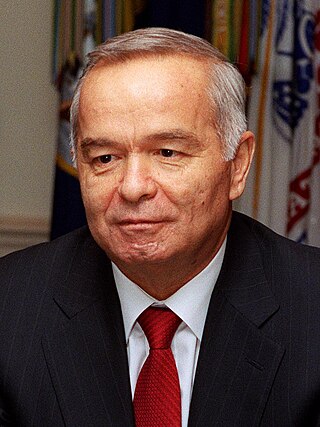
Islam Abduganiyevich Karimov was an Uzbek politician who led Uzbekistan and its predecessor state, the Uzbek Soviet Socialist Republic, from 1989 until his death in 2016. He was the last First Secretary of the Communist Party of Uzbekistan from 1989 to 1991, when the party was reconstituted as the People's Democratic Party of Uzbekistan (O‘zXDP); he led the O‘zXDP until 1996. He was the President of the Uzbek SSR from 24 March 1990 until he declared the independence of Uzbekistan on 1 September 1991.
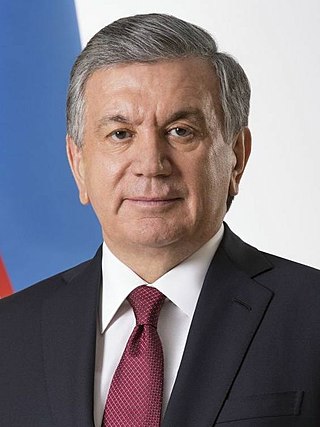
Shavkat Miromonovich Mirziyoyev is an Uzbek politician who has served as President of Uzbekistan and Supreme Commander-in-Chief of the Armed Forces of Uzbekistan since 14 December 2016. Previously, Mirziyoyev led the government as a Prime Minister of Uzbekistan from 2003 to 2016.
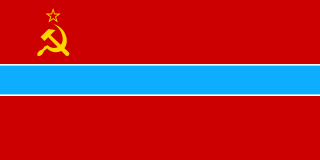
The Uzbek Soviet Socialist Republic, also known as Soviet Uzbekistan, the Uzbek SSR, UzSSR, or simply Uzbekistan and rarely Uzbekia, was a union republic of the Soviet Union. It was governed by the Uzbek branch of the Soviet Communist Party, the legal political party, from 1925 until 1990. From 1990 to 1991, it was a sovereign part of the Soviet Union with its own legislation.
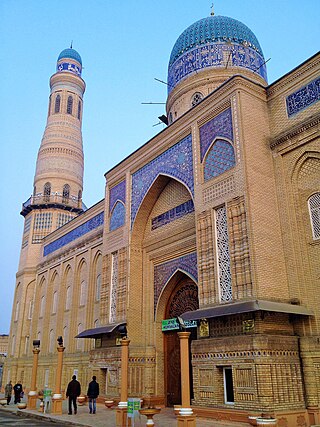
Andijan is a city in Uzbekistan. It is the administrative, economic, and cultural center of Andijan Region. Andijan is a district-level city with an area of 74 km2 (29 sq mi). Andijan is the most densely populated city and it had 547,800 inhabitants in 2022. Andijan is located in a tense border region at the south-eastern edge of the Fergana Valley near Uzbekistan's border with Kyrgyzstan.
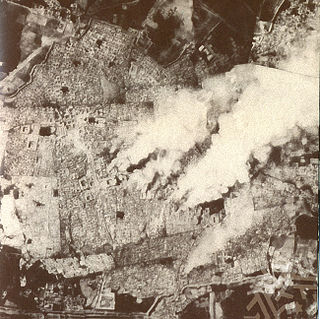
The Basmachi movement was an uprising against Imperial Russian and Soviet rule in Central Asia by rebel groups inspired by Islamic beliefs.

Russian Turkestan was the western part of Turkestan within the Russian Empire’s Central Asian territories, and was administered as a Krai or Governor-Generalship. It comprised the oasis region to the south of the Kazakh Steppe, but not the protectorates of the Emirate of Bukhara and the Khanate of Khiva. It was populated by speakers of Russian, Uzbek, Kazakh, Kyrgyz, and Tajik.

The Khanate of Kokand was a Central Asian polity in the Fergana Valley centred on the city of Kokand between 1709 and 1876. Its territory is today divided between Uzbekistan, Kyrgyzstan, Tajikistan, and Kazakhstan.

Sharof Rashidovich Rashidov was the First Secretary of the Central Committee of the Communist Party of Uzbekistan from 1959 until his death in 1983. During his tenure the Uzbek SSR saw considerable economic growth and had a very high degree of autonomy from the rest of the Soviet Union.
The Tashkent clan is a powerful political clan based in Tashkent, Uzbekistan that controls the Uzbek National Security Service, and since late 2005 the Interior Ministry. The Samarkand clan is its biggest rival for control over the Government of Uzbekistan.
Clans in Central Asia are political networks based on regional and tribal loyalties. Clans frequently control certain government departments, though there is fluidity between clan loyalty and membership in government agencies. The people of Central Asia self-identified by their clans prior to Russian expansion in the 19th century. After the fall of the USSR, the informal agreements between the clans were the only means with which to stabilize the new Republics. Ethnic identity did not come into play until as late as the 1980s during glasnost. The influence of the clans in the contemporary history of Central Asia is derived from the enormous importance that these have held in the past. The weaker states of Central Asia have relied on the social salience of clans to secure their own legitimacy through pacts and informal agreements. These pacts guarantee that the clans have informal access to power and resources and have allowed for the clans to become central actors in post-Soviet politics
The Jizzakh clan is a political clan based in Jizzakh Province, Uzbekistan and allied with the Samarqand clan. It is led by Abdulaziz Kamilov, former Uzbek President Islam Karimov's presidential advisor and current Foreign Minister.

The Amir Timur Museum is located in Tashkent, the capital of Uzbekistan. It opened in 1996, and is dedicated to the Turco-Mongol warlord Amir Timur (Tamerlane).
The 1999 Tashkent bombings occurred on 16 February when six car bombs exploded in Tashkent, the capital of Uzbekistan. The bombs exploded over the course of an hour and a half, and targeted multiple government buildings. It is possible that five of the explosions were a distraction from the sixth, which appeared to be an attempt to assassinate President Islam Karimov. 16 were killed, and over 120 injured.
On 13 May 2005, protests erupted in Andijan, Uzbekistan. At one point, troops from the Uzbek National Security Service (SNB) fired into a crowd of protesters. Estimates of those killed on 13 May range from 187, the official count of the government, to several hundred. A defector from the SNB alleged that 1,500 were killed. The bodies of many of those who died were allegedly hidden in mass graves following the massacre.
Barak is a Kyrgyz village that is surrounded by the territory of Uzbekistan. Its de facto status as one of the world's 91 current international enclaves began in 1999. Administratively it is part of Kara-Suu District in Kyrgyzstan's Osh Region. It is encircled by the Andijan Region of Uzbekistan. Its population was 985 in 2021.

Indonesia–Uzbekistan relations was officially established on June 23, 1992. Both countries have recognized importance of each other's potential; Uzbekistan realized the strategic importance of Indonesia, home to the world's biggest Muslim population and Southeast Asia’s biggest economy, while Indonesia recognize Uzbekistan strategic importance as the gate to Central Asia, a growing economy also a potential market. Indonesia has an embassy in Tashkent, while Uzbekistan has an embassy in Jakarta. Both countries have Muslim-majority population and both are members of Organisation of Islamic Cooperation.
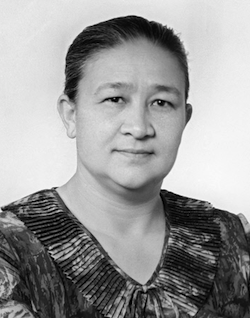
Yadgar Sodiqovna Nasriddinova was an Uzbek Soviet engineer, politician, and high ranking member of the Supreme Soviet of the Soviet Union. After serving in a variety of posts in the Komsomol, she rose through the ranks of the Uzbek Soviet Socialist Republic and became a deputy in the Supreme Soviet from 1958 to 1974. Between 1959 and 1970, she was the Deputy Chair of the Presidium of the Supreme Soviet and subsequently the chair of the Council of Nationalities of the Supreme Soviet until 1974. She was purged from the Communist Party in 1988 after the death of Leonid Brezhnev (1906–1982) and during the corruption investigations in the Uzbek cotton scandal. She was rehabilitated and restored to party membership in 1991, when the allegations of bribery against her could not be substantiated. Nasriddinova was awarded the Order of Lenin four times over the course of her career, as well as twice receiving the Order of the Red Banner of Labour.
References
- 1 2 3 Collins, p. 255
- ↑ Blagov, Sergei. Uzbek strongman under Russian attack. Asia Times. 13 March 2003. Accessed 24 June 2009.
- ↑ Sengupta, p. 286
- 1 2 Uzbekistan: Karimov Appears To Have Political Clans Firmly In Hand . RFE/RL. 31 August 2006. Accessed 24 June 2009.
- ↑ Collins, p. 254
- ↑ Roy, p. 13
- ↑ Sengupta, p. 285
- ↑ Roy, p. 128
- ↑ Collins, p. 263
- ↑ Kimmage, Daniel (23 February 2005). "Uzbek Eminence Falls from Grace". Central Asia Report. 5 (7). RFE / RL. Retrieved 24 June 2009.